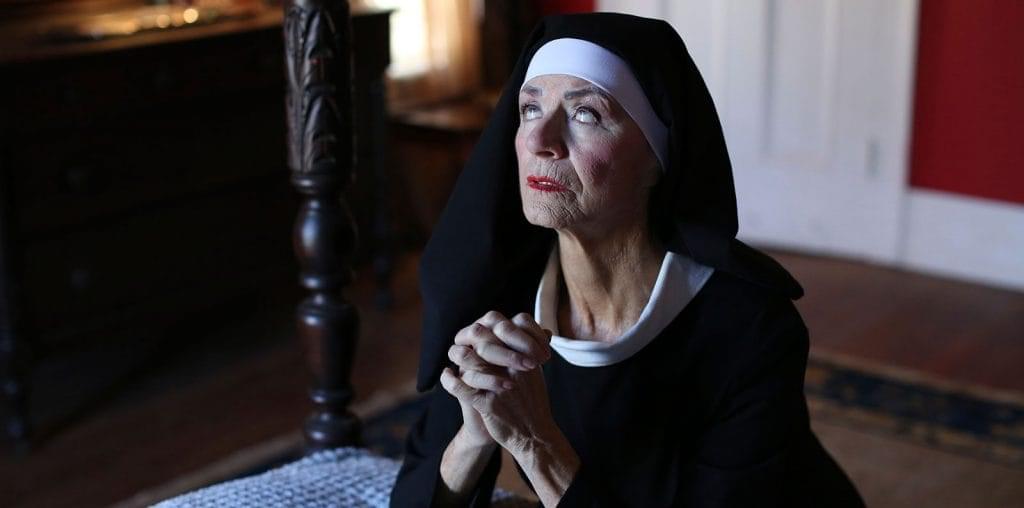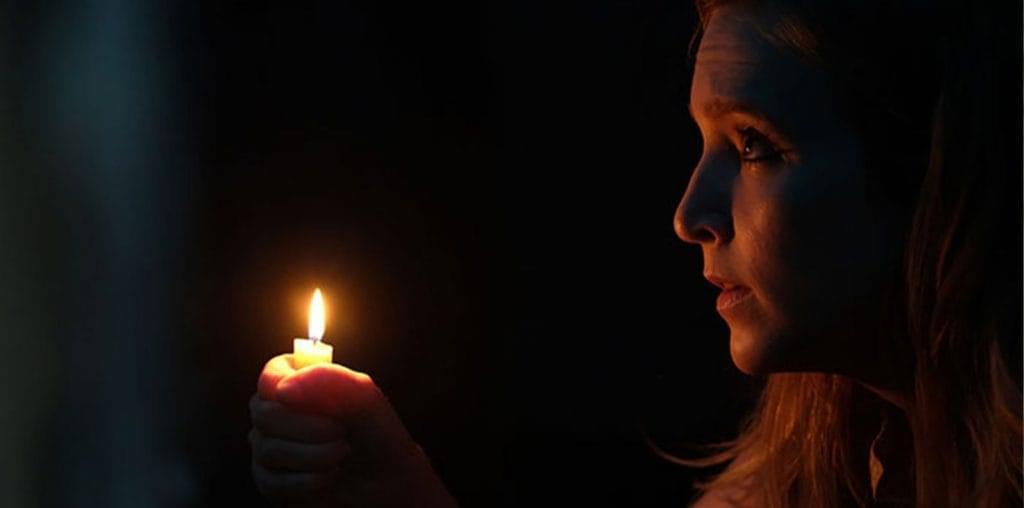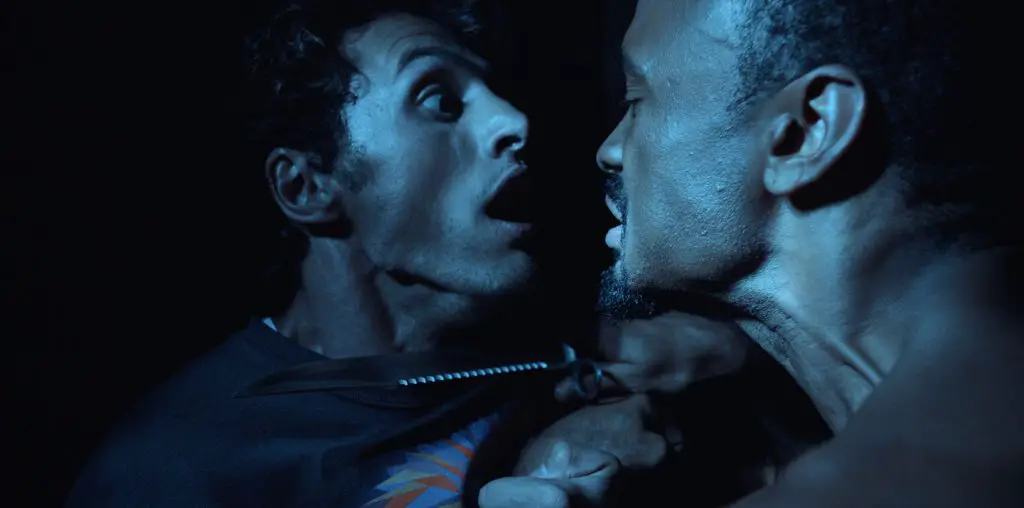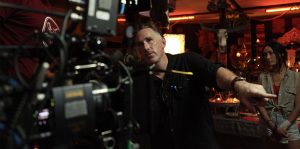
I wanted to ask, just in general, how it was shooting in Thailand, and if you had any advice for a filmmaker who is for the first time directing in a foreign country, what tips would you give them?
I’ll answer that one first because I’ve now directed three foreign countries, Barcelona, Spain, Tokyo, Japan, and now Thailand. It’s like film school all over again. You can think… I’ve done, I don’t know, 16 movies now, and I still feel like it’s my first movie every single time. Because when you go to a different place, there are a completely different set of guidelines and rules, how things work, how people work together, unions, laws, all of that completely changes. for Thailand, it was a culture shock. Not… I don’t mean the culture itself, I’m talking about when you step onto a set, and I’ve made however many movies in North America, you become accustomed to certain things that are considered foreign and weird in other places.
So I think you got to be willing to completely roll with the punches, adapt, and change. What’s great about it is then you can take what you’ve learned back to America and western cinema and try to put that into your toolbox, which I’ve been able to do throughout my years of working in Japan and things. You’re like, “Oh s**t, I never even thought of doing it that way, that’s really clever.” So I think that. How was it working in Thailand? It was… I’ll be honest, first off, it was a beautiful place, home to amazing people. Some of the nicest people I’ve ever had a chance to work with or encounter, but the shoot was hard and arduous. Part of that… most of it was my fault. I went to Thailand with an infected root canal. I’m going to get really gross here for a second.
Oh my God, why did you do that?
Well, I thought I was going to come back home. I’d just had a daughter. So my daughter was just born, and I tell my wife, “I’m going to Thailand to location scout, I’ll be back in two weeks.” I never came back. We were dealing with huge weather restrictions and cast unavailability, so we had to start shooting. So when I left, the plan was I was coming back in two weeks, and then I was going to get the tooth fixed, then I was going to go back. That never happened, so the entire time there, I was on painkillers and antibiotics for this infected root canal, which was fine, I could manage. But then I ended up getting a parasite.
Holy sh*t.
Yes, you’re not supposed to drink the water, and when you brush your teeth, you have these water bottles. Luke and I got drunk one night; I hope he doesn’t mind me telling this story. And I got a pina colada off the street, which I broke the rules you’re not supposed to do. And about two days later, I got sicker than I have in my entire life. I’m going to spare you the details, but let’s say I lost 18 pounds in four to five days. I thought I was dying. I really thought I was dying. So while you’re trying to shoot this movie, having the… So it was a hard shoot for me, but it was all because of my own stupidity.
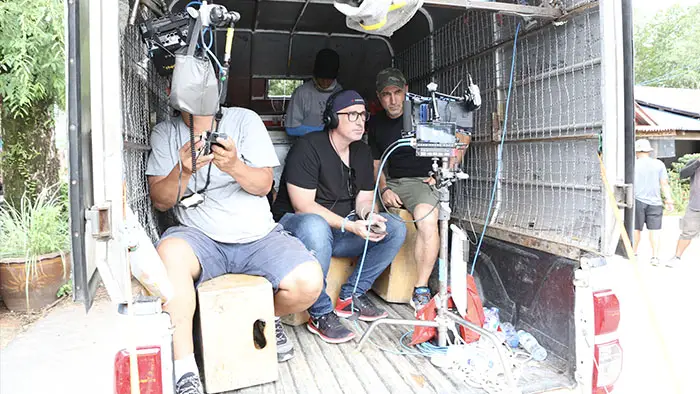
“I wanted it to have a real and authentic something that you can latch on to.”
Once you read the script and knew that it was taking place in Thailand and incorporated Thai culture, what research did you do after that?
So originally, it was set with a voodoo backdrop. And I didn’t want to make that type of movie. I felt that there were already too many movies that delved into such. You’ve seen the voodoo doll, you’ve seen that type of thing before. So we started looking at other places that we can base it, and then we started looking at Southeast Asia. Is there any folklore mythology that we can grab on to? It didn’t have to be based on a true story, but I wanted it to have a real and authentic something that you can latch on to. So we found a book that talked about something that occurred thousands of years… Hundreds and hundreds of years ago called pillars, which was basically towns would bury people, willing participants, in the earth to protect the town and basically be at the center of the town. And they thought that they would protect the town, rid them of evil spirits, and help their harvest. Then it talked about that upon excavating some of these things years and years later, bodies of young children and pregnant women were found. So, we thought that was just a terrifying thing, so we used that nugget of an idea, and latched on to it, and constructed the world around it.
But one thing when you go into a different culture and place, you have to be very careful not to offend or exploit what you’re doing. That was a huge thing for us to be respectful. And so one of the first things we did is said, “Let’s take anything that is currently being practiced and stay away from it. Let’s not get into using imagery that people would know.” We’re not going to put a Buddha on the screen that people would know and say, “Oh, this is happening.” Because that becomes offensive. The second thing that I think was a huge mandate for myself and the producers was that we did not want to portray the islanders as the villains; they could not be villainous. And if you go back and watch it, they’re not bad people. They are doing something that will protect their young, protect the elders, and grant them health and prosperity. It was not that these are evil people. They were doing what they had to do to protect the village.
And the third thing, which probably was the most important thing of all, was we wanted to make the island, not a specific race, that the island was a place, a congregating place for numerous races. And when you look at Alex Essoe’s character who owned the Airbnb, or the guy who ran the beach cafe, we wanted to make sure that people basically gravitated to this island due to its healing properties, and were also completely complicit in the crime itself taking place. And so we see it through the eyes of Maggie and Alex’s character, who is the one manipulating them at the Airbnb. And I think that was an important thing for me to feel comfortable doing it, was when you go into a place like this, you don’t want to be cliche. You don’t want to be trying to say, “Oh yeah, this island is bad, and these people are bad.” So we tried to fictionalize everything that we could and make sure it was… that the characters came from a wide variety of backgrounds and places.
I think that you circumvented that successfully. To be broad with Death of Me, it’s a vacation gone wrong scenario. And there’s a lot of movies like that, and I wanted to know what your favorite vacation-gone-wrong movie is?
Well, if you’re going to ask that, of course, I’m going to say any of the National Lampoon movies, because first off, I love Chevy Chase and Beverly D’Angelo. I think those are just great, but another one that I love, one of my very best friends in the world is in it, so maybe I’m biased, but I love The Ruins with Shawn Ashmore. They go, and they end up getting held captive on this old ruin. I don’t know if you’ve seen it, but it’s where the plants basically come alive and mimic them. If you haven’t seen it, you should watch it. It sounds ridiculous, but it’s great. It’s called The Ruins. It came out maybe eight, or more, years ago; I loved that one. It is a favorite sub-genre of mine. Any time where very bad things start happening and spiraling out of control, I love. Be it horror or comedy, hence the comedy of National Lampoon, but I love the European Vacation, and any of those are just hilarious to me.
